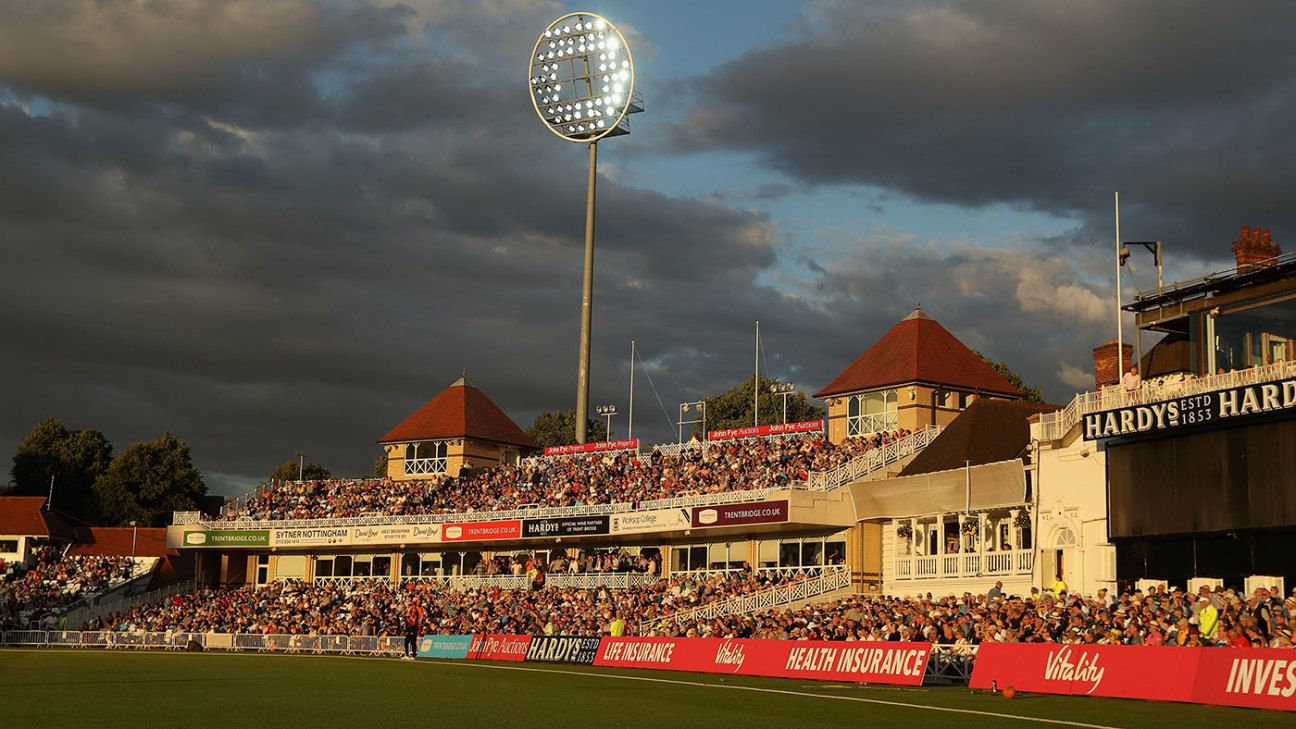The ECB’s proposed new 100-ball competition is “still definitely cricket”, according to Worcestershire’s Daryl Mitchell, the chairman of the Professional Cricketers’ Association (PCA), who has been taking part in two trial days for the format at Trent Bridge. Mitchell, who previously criticised the ECB’s unveiling of the proposal earlier this year, admitted he had been “sceptical” about the concept but was encouraged by the progress made.
Pilot matches for the men, involving county players split into ‘North’ and ‘South’ teams, have been scheduled to take place at Trent Bridge on September 16, 17 and 18, with women’s games at Loughborough on 14, 15 and 27. A variety of different playing conditions have been put in place, largely revolving around five-ball “overs” with two bowled consecutively from the same end, in order to reduce the playing time to less than two-and-a-half hours.
The new tournament, bringing a fourth format to cricket’s already crowded schedule, is set to be launched in 2020. It has been sold as a way of introducing the game to a new audience, with The Hundred – recently registered as a trademark by the ECB – going out in part on free-to-air television as part of the GBP1.1billion broadcast deal agreed last year.
“It’s been interesting,” Mitchell said. “The positive thing from my point of view is that it’s still definitely cricket, which I was a bit sceptical about. In terms of skillsets and things, it’s not very different to T20 cricket, which is a good thing. I see this competition as a vehicle for the lads to go round the world and play in other domestic T20s, and also into T20 internationals. Skillsets are similar, things like strike rates are comparable. The flow of the game is better than I thought [it would be]. It’s a little bit odd changing bowlers and not changing ends to start with but after two sets of 10 you got used to it, and it came naturally by the end of today.”
Feedback forms will be completed by those involved, with the PCA set to survey its entire membership after the trials as well. Mitchell has previously warned that the competition needed to have the backing of the players if it is to succeed, but he said the reaction in the dressing room had been “positive” and praised the way the ECB had gone about developing the format.
“We’ve had focus groups with the players and some of the PCA staff have been involved in working groups as well,” he said. “I think that’s worked pretty well – the communication has been very good and credit to the ECB for involving the PCA and the players in this process and hopefully together we can come up with a fantastic competition that current cricket supporters as well as some new faces will enjoy.”
Mitchell, who was part of the Worcestershire side that won the Vitality Blast at the weekend, said he was not worried about the new competition clashing with England’s existing domestic T20. Scheduling is likely to remain an issue, however, and one that could arise as early as next year with the ECB considering asking the counties to be involved in further 100-ball planning if the trials are deemed to have been a success.
While some of the more outlandish rumoured innovations – such as a side bowling 15 six-ball overs followed by one of ten balls at the end – seem to have been abandoned, there has still been plenty of experimentation across the pilot matches. Powerplays of varying lengths, substitute fielders and tactical timeouts were on show during an open session at Trent Bridge on Monday, as well as a tweak to the Laws that would require a new batsman to be on strike even if the previous pair had crossed.
“The mandatory 10-ball death over sent shivers down seam bowlers’ spines,” Mitchell said. “To get away from that is good. We tried three different lengths of Powerplay, and I think that needs sorting. The substitution thing needs looking at closely if they are going to implement that. It got a bit messy at times, but I think there’s some merit in that. But we have two or three games tomorrow and the England women on the 27th. Hopefully that will iron out a few things. But it’s more a case of dotting the i’s and crossing the t’s. We are not far away from where we want to be.”
On the subject of whether the strike should change if the batsmen cross before a catch is taken, Mitchell suggested it could be something for the MCC to look at for the game as a whole – although the Laws custodians subsequently denied any such change was under consideration. “It’s probably illogical the way it is now,” Mitchell said. “It’s been the laws of the game for however long, but if you get a wicket you probably deserve to bowl at the new batter.
“One thing they do need to get is a good signal for the end of five balls,” he added. “Looking on from the side it was, ‘what’s going on here?’ because you don’t count to five yourself. I think they need a good signal so everybody knows it’s a new bowler coming on. That might be something to look at – I’ll be writing that on my feedback sheet when I go back inside.”
